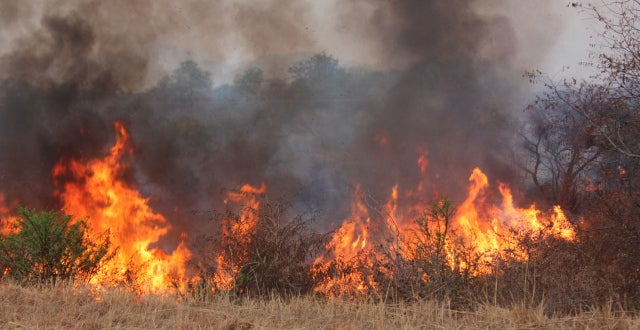By Judith Sibanda
Matabeleland North villagers living adjacent to wildlife national parks are enduring multiple fire outbreaks that threaten to burn down their homesteads and deplete grazing areas.
The fire is allegedly being started by poachers with the most affected being Hwange and Binga and this has resulted in some villagers culling their livestock in fear of losing them.
Chief Shana who superintends the Hwange area said veld fires were caused by poachers targeting communal farms and stray animals from parks.
He said Matetsi one of the biggest villages in Hwange was the most affected together with Isila, Nyamanyama and Lubangwe villages.
Poachers allegedly fail to quell their fire after cooking in the bush during camping days, which results in veld fires.
“We used to blame people for causing them while some have been brought before our traditional court of law facing related cases until we recently discovered that, this is only done by poachers who prey on animals that stray outside the parks where rangers hardly patrol and as a result, people have lost their properties and livestock and this might need urgent intervention from responsible officials.”
Sinothi Dube said Matetsi villagers were faced with starvation and the veld fires were aggravating their plight.
“This is one of the worst years for us this is worsening the situation,” he lamented.
“Along Bulawayo-Victoria Falls high way from Hwange to the outskirts of Victoria Falls, grass and trees have been burnt to ashes by the fires and what more to us villagers who live in rural areas where there is no road to act as a fireguard.
“A week ago, l lost a goat and its newly born kid because of the fires while my neighbour lost three of his sheep that were grazing in his field and we are many of us that have lost livestock while small animals have also been equally affected.”
A Nyamanyama villager said due to random and frequent outbreaks, they had stopped regularly sending their children to the nearest school Matetsi primary school as they walked over eight kilometres to reach the village’s only available government school.
In Binga villagers living adjacent to Chizaria national park said apart from poachers, veld fires were caused by charcoal vendors who burnt down trees and left the fire unattended.
“Vendors from Binga and Hwange centre travel all the way to buy Mopani charcoal here and this is how villagers are earning a living because of drought in our homesteads. These people target the oldest Mopane trees and start to burn it from the roots going up for over a week to make cooking charcoal for sale and as a result most of the times this leads to veld fires.”
Lenziwe Nyoni (56) from Siabuwa village said her family has been left stranded as the fired burnt down her bedroom hut recently.
“My bedroom hut was torched last Monday as I had gone to church. I was notified during the service and l did not take out anything. This is a challenge faced by many of us yearly and what makes it more difficult is that we don’t get compensation nor educational courses about fire management.”
Bhejane Trust founder Trevor Lane who operates in Hwange national park said although veld fires had not fully penetrated into parks, drought was severely stalking wildlife and massive deaths were going to be recorded.
“We have controlled them by fireguards so for now, we haven’t heard of any serious related incident,” he said.
“Veld fires are massive in communal areas and resettlements but where we operate there is a huge challenge of starvation both food and water and due to these natural cycles, we are going to record immense deaths by year-end not that we are not trying by all means to save them.”
According to the Environmental Management Agency (EMA), the fire season starts at the end of May and ends in October.
Chief Shana said together with his headmen and communities they have taken the initiative upon themselves to protect their livestock, grazing lands and fields through the digging of trenches and clearing of any dry material that could trigger fires.

